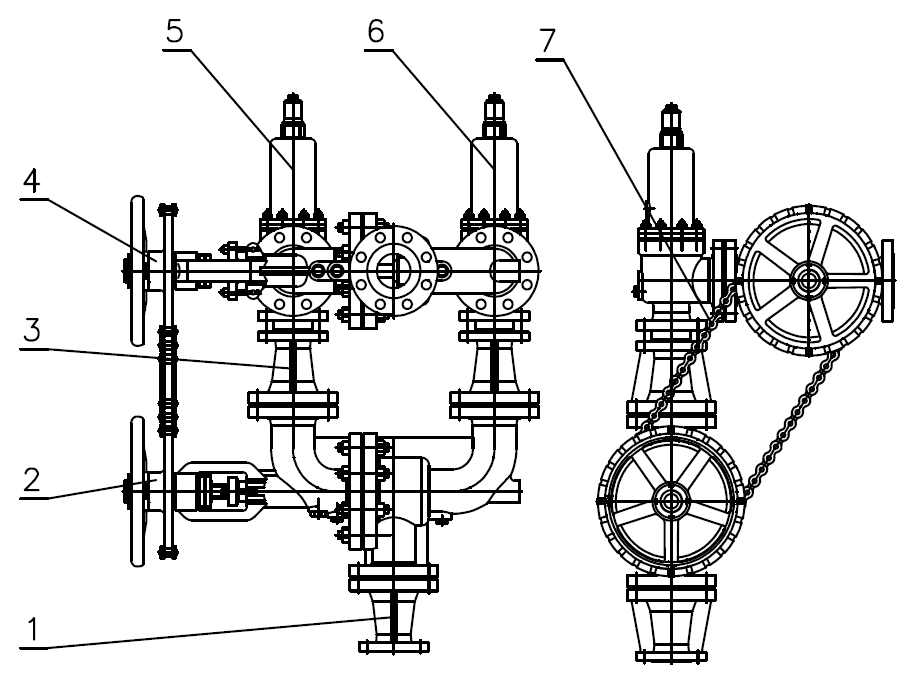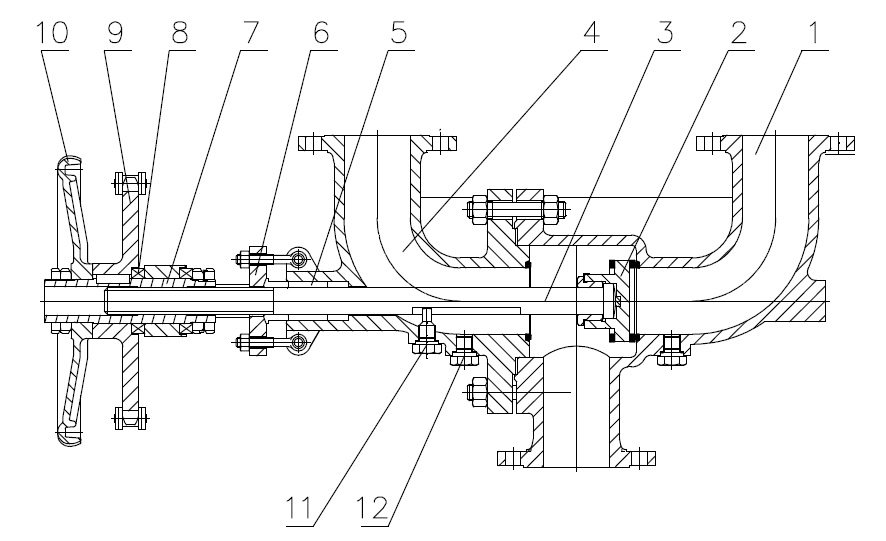Quick Crossover Safety (Relief) Valve Introduction Quick Crossover Safety (Relief) Valve Application   Safety Components for Elevator Elevator Parts,Lift Parts,Lift Components Gearless Traction Machine Co., Ltd. , http://www.zjelevators.comDetails
Quick Crossover Safety((Relief) Valve is a further developped and improved Double Port Safety Valve. It mainly composed two spring loaded double port safety valves, a switching mechanism and a Y Shaped Pipe. The valve inlet is at the bottom of the Y Shaped Pipe. By rotating the Handwheel of the Switching mechanism, one safety valve will open, and the other one will close. These two valves may work by turns. According to the working medium, temperature and pressure,the switching mechanism may be equipped with various types of safety valves so as to adapt the various working condition. The connecting dimension of Flanges may selected according to clients' request.
Working Medium: Gas, Liquid
Sizes: 1"-10"
PN: Class 150LB-600LB.
Applicable Temperature: -196°C~-540°CProduct Description
Double interlocking switch safety device is a new product independently developed by
II. Use & Performance Specification
following functions:
Â
Â
Â
Â
2.3. Performance standard (changeover valve):
Normal temperature test pressure (MPa)
Applicable media
Shell
150
3.0
2.2
0.6
-29~300
Water,gas, oil
300
7.5
5.5
0.6
-29~300
Water,gas, oil
2.4. Maximum working pressure rating of valve (pressure-temperature standard ) (gauge pressure: MPa)
Valve body material WCB:
Temperature (ºC)
-29~38
100
300
Rating Value
1.96
1.77
1.02
Rating Value
5.11
4.66
3.98
Valve body material CF8:
Temperature (ºC)
-29~38
100
300
Rating Value
1.90
1.57
1.02
Rating Value
4.96
4.09
3.09
III. Main Standards:
3.2. The flange connection is in accordance with ASME B16.5;
3.3. The inspection and test is in accordancewith API 527 and API 598;
3.4. The pressure-temperature standard is in accordance with ASME B16.34.
GAKH-150C
GAKH--Goole Changeover Valve;
150--Nominal pressure is 150Lb;
C--Material of valve is carbon steel.
V. Structural features:
5.1. Device Structure:
1. Bottom reducing joint
2. Inlet changeover valve
3. Inlet reducing joint
4. Outlet changeover valve
5. Safety valveI
6. Safety valveII
7. Chain
Â
Â
5.2. Structure of changeover valve:
1. Valve body
2. Valve clack
3. Valve stem
4. Valve deck
5. Packing
6. Packing bushing
7. Valve stem nut
8. Valve bearing
9. Chain wheel
10. handle wheel
11.Anti-rotation screw
12. Plug Screw
5.3. The changeover valve adopts three-way structure.
5.4. The changeover valve body is connected with valve deck by MFM flange.
5.5. The changeover valve is connected with pipeline by RF flange.
5.6. Planar seal is used for the changeover valve clack.
VI.Working principles:
As the figure shows, the changeover valve is designed with two sealing surface,
Quick Crossover Safety (Relief) Valve (GAKH)
Model NO.: (GAKH)
Material: Carbon Steel, Stainless Steel
Size: 1"-10"
Working Medium: Gas, Liquid, etc.
Working Temperature: -196 Deg C - 540 Deg C
Trademark: GOOLE, OEM
Transport Package: Plywood Case
Specification: CE, SGS
Origin: Wenzhou, Zhejiang, China
HS Code: 8481400000
Quick Crossover Safety(Relief)Valve is a further developped safety device from double port safety valve, which consist of a Switch Mechanism in the middle of it.
Order Products
Â
I. Summarize:
Luofu based on the original safety valve and changeover valve. According to the
design of API520 and BS1873, the inlet and outlet of the safety valve on the pipeline
can be switched jointly, allowing for simultaneous opening and closing. This
instruction primarily introduces the changeover valve. About the safety valve, please
refer to our Operating Instructions for Spring Type Safety Valve.
2.1. Use: The product is widely applied as an overpressure protection device on the
corrosive medium and non-corrosive medium pipelines such as water, oil, natural gas
and steam. It has the advantages of small flow resistance, flexible opening/closing,
long service life, superior safety and reliability and compact structure, it is able to achieve
<1. Non-stop operation. While one safety valve is operating, the other can be
taked down for maintenance on the premise of non-stop operation so as
to achieve the maximum economic profits due to reduce the shutdown
period.
<2. Two safety valves share one pipeline, which can reduce both the pipeline
number and cost.
<3. The inlet and outlet changeover valve of the safety valve are allowed for
synchronous operation as well as simultaneous opening/closing, making
the operation more easily and reliably.
2.2. Scopes of application: chemical industry, petroleum refining, oil and natural
gas pipeline transportation, etc.
 Note: The temperature in the table above refers to the temperature of the pipeline media under working
Pressure
Grade(Lb)
Applicable
temperature
(ºC)
Pressurization
and upper seal
Low
pressure seal
condition. The pressure in the table is a sustained non-impact pressure.
IV. Demonstration of the type (changeover valve):3.1. The design and manufacture is in accordance with API 520 and BS 1873;
Â
The handle wheel and chain wheel of the changeover valves located at inlet and
outlet are all installed on the valve stem nut. The handle wheel, chain wheel and valve
stem nut will rotate together. There is a chain located between two chain wheels
through the chain, the two changeover valves and valve stem nuts will rotate at the
same time. Through the trapezoidal nut, the valve stem nut will drive the valve rod to
move up and down then the valve rod drives the valve clack so that two changeover
valve will act synchronously, allowing for simultaneous opening and closing.
allowing one closing while the other opening. Rotating the handle wheel clockwise and
the valve clack will move far away from it so that the sealing surface which is far from
the handle wheel will be closed while the nearby one will be open. In that way, the
inlet and outlet changeover valve of the safety valve which are close to the handle will
be open so as to play a protection role, while the inlet and outlet changeover valve of
the safety valve far away from the handle will be closed, taking no effects and can be
able to disassembled for maintenance. Otherwise, rotating the handle counterclockwise
and the valve clack will move close to the handle wheel so that the sealing surface
which is close to it will be closed while the distant one will be opened. In that way, the
inlet and outlet changeover valve of the safety valve which is far away from the handle
will be opened so as to play a protection role, while the changeover valves of the safety
valve at inlet and outlet which is close to the handle wheel will be closed, taking no
effects and can be able to disassembled for maintenance.
Â